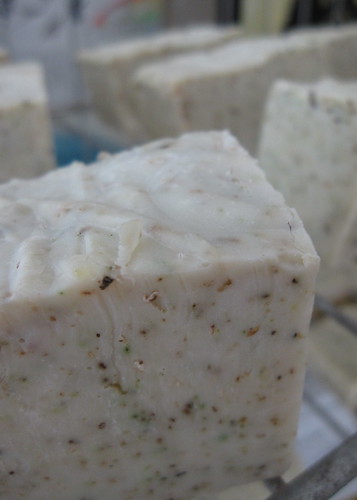Alfalfa in soap you ask? Alfalfa is actually good for the skin, not just eaten as a sprout, which apparently is not so wholesome due to some amino acid on the seeds. I don't have my Nourishing Traditions book at home presently, so i'll have to update this post later. I know that eating alfalfa sprouts is great for a lot of other minerals and vitamins, but today i'll be focusing on its benefits to the skin.

Firstly, I grew my own alfalfa and dried it in my dehydrator - so i know there are no additives or pesticides present. This is not always the case, so if you're looking to source alfalfa locally, try and find a grower who sells 'organic alfalfa hay' or at least 'horse quality hay' and see if they'll let you pick up some scraps from the hay barn floor.
The benefits of alfalfa sound great to me. This website has some scientifical jargon that explains some of the benefits that eating alfalfa sprouts have on the skin. But what about rubbing alfalfa extract ON to the skin? Alfalfa is a great source of protein, minerals and vitamins C, D, E & K for the skin. It conditions and increases skin metabolism to promote skin healing. This website has some information on medicinal and other traditional uses of the plant. These include:
So, from this research i have discovered that the poultice of seeds is most beneficial to the skin, versus the leaves. BUT alfalfa has a super duper long tap root (one of the reasons i planted it in the first place - it breaks of bad soil) that can mine the soil for deeply hidden minerals. So, the leaves must share some of those goodies, even if not to the same quantities of the seeds. If nothing else, they lend a pretty greenish hue to the soap.
- Excellent natural laxative and diuretic
- Detoxification of the urinary tract, and urinary tract infections
- Reduces excess water retention in the bladder
- Excellent natural source of vitamin K
- Well-known blood and liver purifier of chemicals and heavy metals
- Eases joint problems, skin issues and foul breath
- Has a strong alkaline effect on the body
- Excellent neutralizer for the acids in the intestinal tract
- Eases general digestive problems, gastritis and indigestion
- Reduces migraine headaches through combined high magnesium and calcium levels
- Contains bioflavonoids that stop the inflammation of the stomach lining.
- Contains high levels of enzymes for food digestion and assimilation
- Lowers bad forms of cholesterol, and reduces the incidence of atherosclerotic plaques
- Stabilizes blood sugar levels, particularly when taken in conjunction with manganese
- Improves pituitary gland functioning
- Stimulates the immune-system
- High level of vitamin K adds to the effective healing of bleeding gums and nosebleeds
- High bioflavonoid count increases blood capillary strength
- High levels of Vitamin K2 may partially prevent bone loss due to lack of estrogen in menopausal women -Global Healing Center .com
Not the most wholesome of my Wednesdays, but interesting nonetheless.

No comments:
Post a Comment
Thank you so much for your feedback, especially if you've cooked one of my recipes or tried one of my tips: let me know how it turned out!